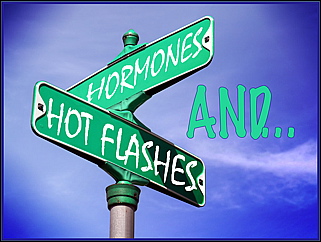Hormone Healthy Food Choices

When hormones become unbalanced, they can negatively affect our health, put us at risk for cancer and heart disease, and destroy our mood and productivity. No matter what your age, consuming the right foods is a natural and effective way to keep order in the endocrine system.
To accomplish this, your daily meals should include:
- Less fat and more fiber. It takes a lot of energy to digest fat. The less energy you spend on digestion, the more efficient your body becomes with its other metabolic responsibilities -- like brain function, hormone production and energy level maintenance.
- Fresh fruits and vegetables. They help with the excretion of toxins. When the body makes new hormones, it needs to purge the expired ones, and fiber helps do that properly. Eat at least five portions each day, and pay particular attention to leafy vegetables such as kale, spinach and baby salad greens. It's no secret that foods like these, rich in calcium and vitamin D, can increase bone strength and improve your overall skeletal health. But new evidence shows they also help calm jangled, hormonally harassed nerves.
- Complex carbohydrates. Whole grains are high in fiber and B vitamins, which are important for hormonal balance. In a study conducted at the University of Tennessee Health Sciences Center, researchers reported that women with premenstrual syndrome (PMS) who ate a meal high in carbohydrates (but avoided sugar and white flour) were happier and more relaxed within one hour. Women in another group who ate a high-protein meal felt angry, sad, and more agitated. Within three hours, the carbohydrate group's blood sugar returned to normal levels, and they needed to eat again.
Based on this study, women who suffer from PMS should eat smaller, more frequent meals that include carbohydrates. The 3/500 Rule (snacks or meals of 500 calories or less every three hours) defines hormone health.
*Foods rich in essential fatty acids (think Omega 3). They have an anti-inflammatory effect on the body and reduce abnormal clotting, which helps prevent endometriosis and fibroids. Eat oily fish (tuna, salmon, sardines, mackerel, and herring) three times per week, along with nuts and seeds (walnuts, flax, sunflower, pumpkin). Bonus: Omega 3 fatty acids are also good for the brain and can elevate your mood.
*Soy. It contains phytoestrogens, a mild estrogen-like compound that fits into the body's estrogen receptors and blocks potentially negative effects -- including cancer -- of more powerful estrogens. They also reduce hot flashes, vaginal dryness, and other symptoms associated with menopause. The isoflavones in soy promote calcium absorption and decrease susceptibility to bone breakdown and loss. Furthermore, when estrogen is declining or fluctuating, isoflavones help regulate that unpredictable hormone, alleviating many menopausal and PMS symptoms. (Confused about soy? If you missed it, please check our previous article: The Soy Controversy)
*Beans. According to nutritionist Susan Krause, MS, RD, the isoflavones in beans may stabilize symptoms of PMS, perimenopause, or menopause, and possibly help prevent tumor formation related to breast cancer. Although soybeans have among the highest levels of isoflavones, other sources include favas, lentils, and chickpeas. And if pregnancy is in your plans, beans can give you a steady supply of folic acid -- essential for normal development of the fetus.
*Filtered water. Lots of it. Stay on a hydration schedule. Because your brain is about 80 percent water, this will improve your mood and attitude, and conquer your hormone headaches.
Notice we didn't recommend milk? The cow pumping out all of that calcium is not drinking milk or taking calcium pills. It's eating grass! Leafy green vegetables are the most absorbable form of calcium for cows and humans, and assist with the placement of calcium into the bone structure.
If your diet does include meat and dairy products, eat low-fat and organic versions. These come from animals that were not fed hormones, growth-enhancing antibiotics, or grain raised with synthetic pesticides (which may disrupt hormones as well). Hormones love fat, so they're virtually swimming in whole milk. If you're worried about keeping your endocrine system in order, don't add to the mess by eating foods overflowing with additional hormones.

Other foods to avoid during menopause:
*Excess sugar. It can stimulate cravings and suppress the body's ability to utilize the calcium and phosphorus needed to build bone.
*Excess fat and cholesterol. For reasons mentioned above; also, as estrogen levels plummet, cholesterol can rise.
*Alcohol. It can exacerbate the symptoms of menopause. If you are at risk for breast cancer, don't drink at all.
*Caffeine. Research shows that PMS intensifies with the consumption of caffeine-containing beverages. In one study, women who abstained from caffeine during the PMS phase of each month resolved their symptoms completely.
*Refined and spicy foods. Along with sugar, alcohol, and caffeine, these may trigger hot flashes, mood swings, vaginal discomfort, and other negative hormonal symptoms. Maintain a food and mood diary to help you determine which ones impact you most.






















